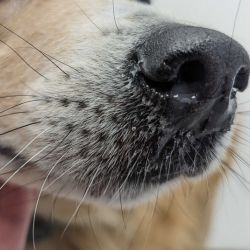Sneezing in dogs is different from reverse sneezing. The odd sneeze is not a cause for concern.
Dogs sneeze for a variety of reasons, just like humans. Some sneezes are more serious than others. Show your vet a video of your dog’s sneezing episode so we can determine what’s happening.
What to do
What you should do if your dog is sneezing
Monitor your dog and watch out for changes:
- Is it the odd sneeze?
- Does your dog keep sneezing?
- Are they occasional but intense sneezing episodes?
- Is it accompanied by other signs such as runny nose, coughing, gagging, vomiting, eye discharge, tiredness, or lack of appetite?
Contact a vet if your dog’s sneezing persists or if other symptoms accompany it.

Causes
Why your dog may be sneezing
The most typical causes of sneezing in dogs are:
- Irritants/allergies – cleaning products, perfume, dust, pollen, smoke, and others.
- Respiratory infections – viral, bacterial, parasitic, or fungal infections
- Foreign material – inhaling a foreign object that can get stuck in their nose or nasal passages.
- Dental disease – tooth and gum disease can affect the inside of the nose, causing sneezing.
- Play sneezing – they usually show this peculiar behaviour during playtime, which is interpreted as a sign of happiness.
- Growths and tumours – find out more in the “other causes” section below.
When to worry
When you should worry about your dog sneezing
Contact your local vet practice if your dog shows any of the following signs:
- Struggling to breathe or gasping for air
- Gums or tongue become blue or grey
- Sneezing blood
- Not eating or drinking
- Being very tired
- Failure to improve despite treatment
Joii can help if your dog:
- Is sneezing occasionally
- Does reverse sneezing
- Has nasal or eye discharge
- Is coughing or wheezing
- Is showing lack of appetite
- Has tiredness
Prevention
How to prevent your dog from sneezing
Prevention will depend on the cause of sneezing.
Make sure your dog receives an annual kennel cough vaccine to prevent sneezing due to the flu.
Keep your dog up to date with regular deworming medication, making sure this also covers lungworm.
Avoid exposing your dog to irritants and allergens. Vacuum your home regularly, and avoid spraying aerosols.
Take your dog for annual health checks with your vet so early tooth and gum disease can be detected.
Diagnosis
Is your dog reverse sneezing?
How to tell the difference between normal and reverse sneezing
Retching, coughing, gagging, reverse sneezing, hiccupping, and wheezing can all be mistaken as a sneeze.
Reverse sneezing occurs when your dog rapidly pulls air into the nose.
They make a snorting sound, which can make them look like they have something stuck in their nose or throat.
Although it can be alarming to witness this type of sneezing, it is not a harmful condition, and there are no ill effects. It usually lasts for several seconds to 1 minute.
Get a video of your dog sneezing to help confirm the symptom.
Home treatment
How to look after a sneezing dog at home
Following your vet’s recommendation, you can help them recover at home by:
Wipe their eyes and nose: This will help them smell their food and breathe more easily. Use a cotton wool pad soaked in warm water to wipe any discharge from their eyes and nose.
Help them breathe more easily
- Place them in a steamy room (i.e. the bathroom while someone is showering). This will help break down some of the thick mucus in their airways allowing them to breathe more easily.
- Or you may use a humidifier or nebulizer to clear the nasal passage.
Help them eat better: Add a small amount of warm, smelly food to their meals (e.g. chicken, minced beef).
Remove irritants: If your dog suffers from allergies, open windows (if safe to do so) to let air in, vacuum your house, and wash bedding regularly.
Vet treatment
How vets treat a sneezing dog
Sneezing in dogs is treated by targeting its underlying cause. Treatment options may include:
- Anti-inflammatories (steroidal or non-steroidal)
- Antibiotics
- Antihistamines
- Appetite stimulants
- Medication that stimulates the immune system
- Humidifiers or nasal saline drops to help with nasal congestion
- Surgery, if foreign bodies need to be removed or to treat tooth root infections
Risk
Are some dogs more at risk of sneezing than others?
Dogs with lifelong diseases such as allergies may be more prone to sneezing.
Flat-faced breed dogs (brachycephalic breeds) have a very particular facial shape with short nasal passages making them more likely to sneeze. Find out more about BOAS in dogs.
Working dogs may be more at risk of inhaling foreign bodies, such as grass seeds.
Other causes of sneezing in dogs
Other causes of sneezing include benign growths or abnormal conformation of the nose and mouth (seen in flat-breed dogs). These changes create obstruction, irritation, and inflammation that causes them to sneeze.
Malignant tumours are always on the list of possible causes, but they’re not a common condition. When present they are more likely to occur in older dogs.








